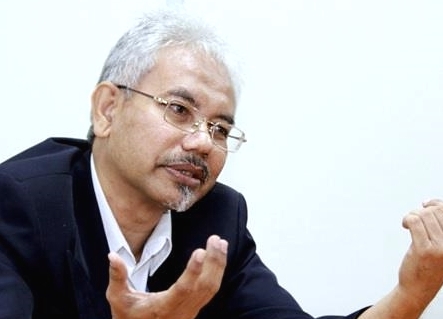
By Prof Dr. Mohd Tajuddin Mohd Rasdi
In a week, Muslims around the world will greet the holy month of Ramadan. To many Muslims, Ramadan means two important things in their lives; the Ramadan Bazaar and the Terawikh Prayers. In this article, I will explain the true teachings of Ramadan both to Muslims and Non Muslims. It is most ironic that most Muslims will experience the true teachings of Ramadan in this particular year after fasting and praying for decades. Why? Because in this year, the virus has come to instill the true teachings that ustazs, muftis and academics have failed to do.
The issue of the Ramadan Bazaar and the performance of the Terawikh Prayers have the potential to be a flash point in Malay society and politics. Whatever becomes an issue in Malay society, it eventually becomes an issue in Malay politics. The call has gone out that there will not be any form of Ramadan Bazaar and that the Terawikh Prayers are to be performed at home. Many Muslims are shocked because they have always performed the Terawikh in congregation and they do not know that it can be done individually or in congregation at home. As with the idea of the Ramadan Bazaar, most Muslims learn Islam through social norms and practices and not through a critical or an academic structure.
I would like to firstly deal with the issue of fasting and its intended teachings in Islam as I have come to understand it. Firstly, the practice of fasting in Islam is as follows in its physical, mental and behavioral sense. Physically, a Muslim must not eat or drink from sunrise to sun set. Physically also a fasting Muslim must not have any sexual relationship with his or her spouse. Both eating and sexual relations are allowed after the breaking of fast. Mentally, the Muslim in fasting must not think about food and the pleasure of eating. Mentally, the fasting Muslim must also not think about impure things like sexual relations and hatred for others. Behaviorally, the fasting Muslim must exercise full PATIENCE at all times. Getting angry is forbidden. Thus, ideally, the fasting Muslim is a calm, patient and soft speaking personality in Ramadan than he or she is in other days. Socially, the fasting Muslim must be generous in charity. The fasting Muslim must also spend more time thinking of Allah through acts of additional prayers and Dzikir or repetition of short phrases in remembering Allah.
Those are the physical, mental, social and behavioral aspects of the outward form of fasting. What is, therefore, the teachings of fasting to Muslims? Firstly, fasting denies the basic selfishness of gluttony for food and other appetites such as sex and love of titles and properties. Fasting is the act of voluntarily denying food and drink so that the 'nafs' or 'desires' are tamed. However, this does not happen to most Muslims who keep thinking what to eat during the breaking of fast. Their heart is tied to the Ramadan Bazaar. Many religions teaches the evilness of subjugating ourselves to the gluttony of the 'self' into selfishness. Islam uses fasting in Ramadan for 30 or 29 days to tie up the nafs or the self for the year.
Secondly, Muslims learn what it means to be hungry from the perspective of the poor. Muslims are encouraged to give food to other Muslims to break the fast. It is said that if one provides food for another to eat, then the fasting rewards of that other person will also be given to the giver of foods without reducing any blessing from the other. All mosques would prepare food for guests during the 30 days of Ramadan. So, if you are out of luck and have nowhere to eat, then go to any mosque and surely you will be given food. Unfortunately many Muslims think that this food is only meant for the fasting Muslim and not to any other. I take the position that the food is for all. During the fasting month, it was said that the generosity of the Prophet Muhammad is like the wind as he was extra generous. It is said in the Qur'an that the good deeds of the fasting Muslims is multiplied many hundred folds during this time. This is akin to a 'sale' month for Muslim as one small act of kindness is multiplied more than 700 times.
Thirdly, Muslims can feel that the tastiest food and drink is not the 100 ringgit hotel buffet but the simple glass of clear water and the small date or piece of bread. When one is denied something, then one can only appreciate its greatness then. For all the wealth a person may strive for, it can never equal a drink of clear water to a thirsty person. Many times in life we take things for granted for until we fall sick and lay there in bed can we contemplate the many real things that matters in life.
Since the COVID-19 virus has denied the Ramadan Bazaar, Muslims can now learn the true teachings of fasting. It is about self-control and it is also about sharing wealth with others. The virus has caused untold misery to many and Muslims can now spend on the poor than their overeating indulgence at the Ramadan Bazaar. My cardiologist informed me that he treated more Muslims for heart attack triggered by overeating especially during the month of Ramadan.
With respect to the Terawikh prayers, many Muslims do not know the early beginnings of this ritual. As I have come to understand the beginning of Terawikh from my readings, the Prophet used to pray 'ALONE' in his mosque which was his home. Some Muslims saw him doing that and began to follow him in prayers during the month of Ramadan One night, the Prophet did not come out to pray as usual and so the Muslims started throwing small pebbles to wake him up. The Prophet came out and said that he saw that many were following his night prayers during Ramadan and he does not want to put the people in any difficulty of the practice. That was why he kept away one night to show that the Terawikh is an individual prayer. Since that day Muslims were praying the Terawikh in individual manner. When Umar saw that many Muslims were praying Terawikh individually at the Prophet's mosque after the Prophet's passing, he ordered that the Muslims who came should pray under one imam. Thus that is why the tradition of Terawikh as a congregational prayer started. I seldom perform Terawikh at the mosque but I do it at home. Sometimes I lead my wife in prayers and sometimes I pray alone the Terawikh prayers. To me, the teaching of the Terawikh prayers is to let the Muslims get used to performing an individual prayer at night after the Isya' prayers. The additional Terawikh is a practice of later on perhaps in doing the Tahajjud Prayers which is a prayer in the silence of the night after we get up from sleeping at 2 or 3 am and then continue sleeping. The Tahajjud Prayers is an individual optional prayers performed by those who have strong commitment to faith and wishes to be 'alone' with Allah while everyone is sleeping. The problem with Muslims is after following the congregational Terawikh for 30 days, they forget to follow through with performing optional and individual prayers like the Tahajjud.
From the above explanation, the virus seems to remind Muslims that the issue of Ramadan Bazaars and Terawikh Prayers in Mosque congregation is really a Non-Issue. The Ramadan Bazaar and the Congregational Terawikh at the mosque is a cultural tradition. Both are allowable in Islam and are not wrong to have but both have no tradition in the life of the Prophet Muhammad because fasting is an affair of controlling the self from greed and gluttony and developing a conscience for the poor and destitute. The Terawikh, in turn is the practice of humbling oneself to Allah in a lone quest for spiritual uplift. The coronavirus has pressed the pause button for the Muslims in Ramadan and encourages them to reboot their thinking into a truer form of fasting and prayers.
(Professor Dr. Mohd Tajuddin Mohd Rasdi is Professor at a local university.)
ADVERTISEMENT
ADVERTISEMENT


































